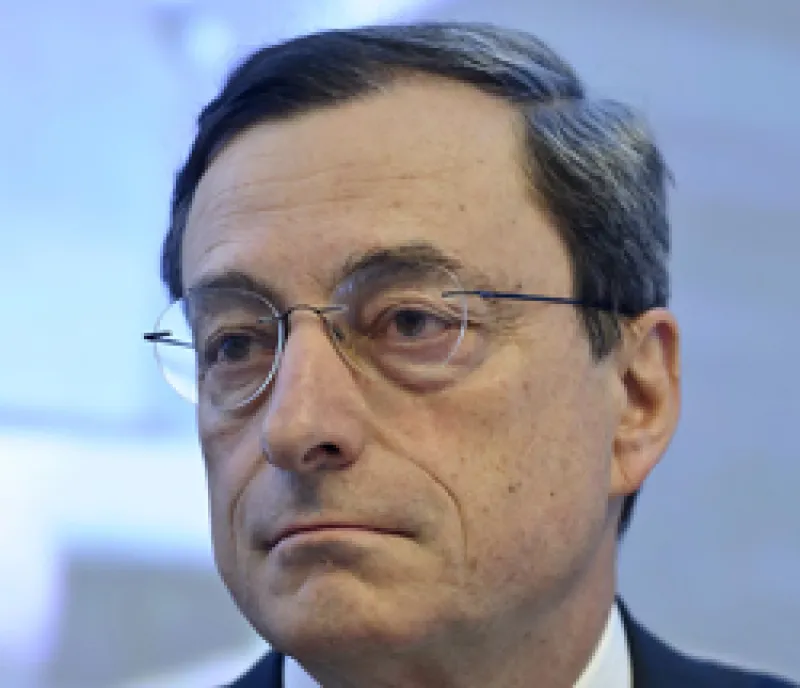'Super Mario' — as Mario Draghi, the Governor of the Bank of Italy, is known to his compatriots — was catapulted into the express lane via Frankfurt after being endorsed for the European Central Bank’s top job by French President Nicolas Sarkozy last week.
Sarkozy essentially abandoned his partner in European governance, German Chancellor Angela 'Madam No' Merkel — who is officially still on the fence about supporting Draghi — to strike a deal with the Italians that will ensure both the ascendancy of Draghi to the ECB presidency and the continuity of a French position on the six-member Executive Board.
When the current president, Jean-Claude Trichet, steps down from the bank in October, the ECB executive club will be left without a French representative. But it just so happens that Italy already has a member on the board, Lorenzo Bini Smaghi, making two if Draghi were to become president. So, Sarkozy deftly negotiated a deal with Prime Minister Silvio Berlusconi — who showed uncharacteristic foresight — that France will support Draghi if, upon his coronation, the Italians withdraw Smaghi and make way for a Frenchman.
Draghi was arguably the natural choice for France because any other candidate would likely have been a German (or German-like) candidate. The French generally consider the Germans to be far too hawkish on monetary policy — particularly on interest rates — and were, on the whole, against a German candidate from the start. That country’s fiscal hawkishness was certainly highlighted last year when the Bundesbank voted against the ECB bond purchase program, whereby the bank has been buying-up government bonds in weaker Eurozone states.
Sarkozy made his endorsement at a press conference with Berlusconi, saying, “France will be very happy to support an Italian [Draghi, not Carla Bruni] at the presidency of the European Central Bank.” Then, lest his remarks be misunderstood, he added: “We aren't supporting him because he's Italian. We're supporting him because he's an excellent candidate.”
Indeed, by almost all standards, Draghi is considered a highly capable choice to lead the ECB as it steers the Euro through an ongoing sovereign debt crisis. An MIT-trained economist (in fact, he was the first Italian to earn a PhD from the acclaimed university), Draghi served as an executive director of the World Bank in the 1980s; spent ten years as the director general of the Italian Treasury in the 90s; worked as a vice-chairman and managing director for Goldman Sachs out of London between 2002 and 2005 (a stint that makes some European elites nervous); and most recently, in addition to serving as the head of the Bank of Italy, has chaired the G-20 Financial Stability Board.
Alberto Giovannini, a former colleague of Draghi’s at the Italian Treasury, says Draghi’s economic philosophy is in line with that of Ben Bernanke (who graduated from MIT around the same time) and Mervyn King, both moderate Keynesians. “He was influenced by the philosophy that expectations are very important,” Giovannini says, “and that monetary policy cannot be subject to too many objectives.” Moreover, Giovannini, who first met Draghi while studying at where-else-but MIT, and is now the CEO of Milan-based asset management firm Unifortune, implies that Draghi is likely to continue many current ECB policies. “Trichet is probably the best middle-of-the-roader I’ve ever seen in my life, and I would rate Mario basically in the same spot,” he argues.
Nonetheless, influential segments of both the European (mainly German) public and political elite, fueled in some cases by fiscally hawkish ideologies, and in others by more populist and isolationist impulses, have been outright hostile to the notion of an Italian becoming the continent’s number one central banker.
After Merkel’s top-choice for the ECB presidency, Axel Weber, stepped down from the Bundesbank presidency and took his name off the ballot for the ECB job in February, the Germans were backed into a corner. Weber had been the frontrunner — and Germany’s only viable candidate — and his departure from the race created a real opening for Draghi. Bild, a conservative, Merkel-leaning tabloid, cautioned against putting an Italian in charge of the ECB, no matter how good his qualifications, explaining, “For Italians, inflation is a way of life, like tomato sauce with spaghetti.”
As one European policy analyst, who asked to remain anonymous, notes, “Merkel can be weakened domestically by a central banker coming from the south of Europe.” But, he adds of Draghi, “the fact that he’s Italian doesn’t mean he’s for easier money.” While perhaps less hawkish than Weber, Draghi is “not a dove,” says the analyst.
Giovannini, meanwhile, is more blunt: “the debate about him being Italian is crap” and “a waste of energy.”
It was thought that Merkel had come to agree. For one, last week, even Bild did an about face and announced its endorsement of Draghi. The front page of the tabloid showed an image of the central banker wearing a Prussian helmet, below the headline, “The new ECB chief is so German.” Moreover, the German finance minsiter, Wolfgang Schäuble, announced his support for Draghi. However, Der Spiegel reports today that the Chancellor is still unsure of putting an Italian in charge. The magazine notes that Merkel is "concerned that supporting Draghi to head the ECB would be difficult for German voters to swallow."
But will she really be able to block Draghi following the endorsements of Sarkozy, Schäuble, and Bild?
More likely, she, too, will need something in return for throwing her weight behind the Italian. Possible concessions Merkel could demand include putting a German in Draghi’s post at the Financial Stability Board (Der Spiegel has suggested that the new president of the Bundesbank, Jens Weidmann, might be a contender), as well as rewriting some language for the ECB rulebook that stipulates a geographical balance in the makeup of the bank — basically, guaranteeing that a German would get the presidency the next time around.
Well, one would imagine that a plate of homemade meatballs wouldn’t quite do the trick.






